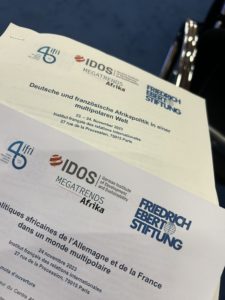Cooperation between Germany and France is key to reshaping EU-Africa relations. This year’s edition of the Franco-German exchange on potentials and challenges in policy-making towards Africa took place from 23 to 24 November. Organised by the Institut français des relations internationales (ifri), the Friedrich-Ebert-Stiftung and the German Institute of Development and Sustainability (IDOS), this year’s conference focused on the security situation in the Sahel region, climate and energy policies and a comparative perspective on colonial history and restitution policy in both countries.
Relations between Europe and Africa are of particular importance for jointly tackling global challenges of the future. Germany and France have a central role to play in shaping European-African relations. Against the backdrop of global power shifts, the aim of the conference was to discuss Franco-German cooperation, perspectives and initiatives on and with the African continent.
The exchange, which took place from 23 November to 24 November in Paris, is part of an annual series of events organised by the German Institute of Development and Sustainability (IDOS), the Institut français des relations internationales (Ifri) and the Friedrich-Ebert-Stiftung. Since 2014, the three institutions have been working closely together and facilitating a dialogue involving political decision-makers, diplomats as well as experts, academics and non-state actors from both countries and both continents.
- Among those invited to this year’s meeting were Dr Nils Schmid, Member of the German Bundestag, Director-General for Africa in the Federal Ministry of Economic Cooperation and Development (BMZ) Birgit Pickel, Commissioner for Sub-Saharan Africa and the Sahel at the Federal Foreign Office Christoph Retzlaff as well as numerous other high-ranking representatives from the BMZ and the Federal Foreign Office, the French Foreign Ministry and the French development agency AFD. On part of IDOS, Dr Julian Bergmann, Dr Benedikt Erforth and Dr Stephan Klingebiel were involved in the event.
The event kicked off with a panel discussion on French and German climate policies. The debate focused on the topic of energy security and just transition in dialogue with African partners. The participants agreed that energy is a key sector when it comes to achieving global climate targets and that Germany and France should therefore support the expansion of African capacities in the area of renewable energies. Participants referred to the Nairobi Declaration of the first African climate summit as a positive signal, formulating a joint African position on climate policy for the first time. Participants concurred on the dual nature of the energy transition, recognizing its capacity to serve as a catalyst for sustainable development while acknowledging the potential for social tensions and diverging interests between African and European partners.
The second part of the conference focussed on prospects for future European involvement in the Sahel and the increasing political fragility in the region. The participants pointed out that it is necessary to learn lessons from Europe’s engagement in the Sahel in recent years and to develop new approaches. This is particularly warranted in view of the military coups in Mali, Burkina Faso and Niger, the still very difficult security situation and the impending collapse of the G5 Sahel as a regional cooperation structure.
Finally, the third part of the conference focussed on French and German approaches to dealing with their own colonial past in Africa. The topic of restitution of cultural assets and the question of how this can be realised at both governmental and societal levels played a central role in the discussion. The panellists also explored possibilities for Franco-German cooperation on this topic and delved into strategies for facilitating mutual learning.

